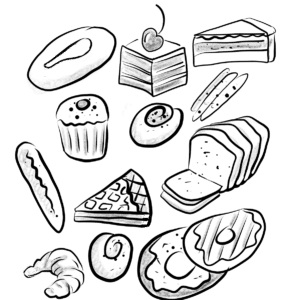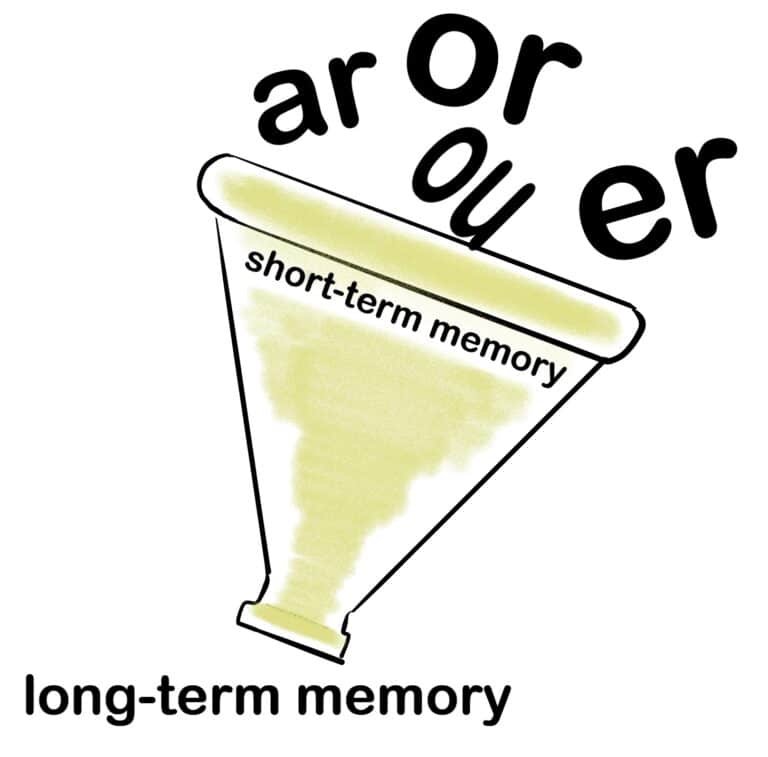
How Going Gluten-Free Transformed our Home
Hi, I’m Melissa, Beth asked me to explain how going gluten-free made a difference in our household. I have a

Are you looking for ways to strengthen your child’s memory? I am.
I When my son, Harry, was in primary school, we switched him to a school over the road from our house. There were several reasons for this move, but one of the major benefits for me was that it wasn’t so far for me to go if (obviously, I mean when) Harry forgot his lunch, recorder, glasses, etc. I’ve spent years looking for ways to help Harry remember things.
Harry is now in secondary school, which is a ten-minute bike ride from home. We bought him a bike with a rack on the back to enable him to carry his saxophone.
School starts at 8.45 a.m.
At 8.30 this morning, I was merrily pegging out washing, silently congratulating myself on remembering to put the wash on last night so I could get straight on with my book launch tasks. The launch is next week. So much to do and so little time!
There was a roar from inside the house. Harry had discovered he’d taken the rack off his bike at the beginning of the week and had forgotten to re-attach it. Now he needed me to take him to school because he’d never get there in time.
I dashed inside and threw on some clothes — rest assured; I was wearing my dressing gown (I don’t go in for nude washing hanging).
I raced to the car only to find my daughter’s vehicle was on the drive. Mine was in the garage. My car has a bike carrier, therefore I had to move her car and get mine out.
Car manoeuvres accomplished, Harry put his bike on the car and got in.
I asked, “Where’s your saxophone?”
He replied — this requires a dramatic pause for you to appreciate how annoying his answer was:
“Oh, I forgot to bring it home. It’s at school.”
A few choice words crossed my lips and now I feel bad, because I know memory challenges are part of living with dyslexia.
People with dyslexia often have weak short-term memories. There are many reasons for this, but one is that a person with dyslexia’s brain is working much harder than the brain of a person who doesn’t have dyslexia. This extra work uses up cognitive capacity, hence working memory suffers.
Memory is now understood to be more than the ability to remember stuff; there are specialist areas within this field. Marie Ripple, who created the dyslexia programmes All About Reading and All About Spelling has the following explanation of the different types of memory on her website. You can use this affiliate link for a free resource on helping your child’s memory.
I have struggled with a poor memory all my life. I find it impossible to remember people’s names or their faces. Harry has a similar problem. He has multiple teachers and always forgets their names. Almost at the end of the school year, he still hasn’t got a clue what his teachers are called. When I had to email has maths teacher yesterday, Harry told me his name was Mr B. I can understand why he said that. When Harry sees a long name, he picks the first letter and uses that as the person’s name.
There’s nothing more embarrassing than meeting someone you know well and forgetting their name. Worse still, if you meet them when you are with someone, and you need to make introductions. I’ve wanted the ground to swallow me up on numerous occasions when I couldn’t for the life of me remember a good friend or neighbour’s name.
The other thing about having a weak memory is it is so unpredictable. Some days I have no problems remembering things, yet on others, my brain is out to lunch.
Most people with dyslexia have problems with short-term memory. Marie Rippel likens short-term memory to a funnel. If you put too much in, the narrow exit tube blocks. When it comes to learning new information, the key to making facts stick is to only teach a child one concept at a time.
When Harry was younger, I used Marie’s All About Spelling and All About Reading resources with him every morning before school. Check out this post to learn more.
I found these resources excellent for Harry as they emphasise revision and regularly repeat the key concepts. School spelling tests rarely work for children with dyslexia. A one-off test is of little use in committing a new word to memory. In primary school, I asked Harry’s teachers to reduce the number of words on his spelling tests and, whenever possible, he avoided taking them. We worked on his spelling at home using the All About Spelling programme. Working slowly and surely and reviewing information at regular intervals is the only way to prevent spelling words from being forgotten.
This is the ability to hold information in your head while you do something with it.
For example, a verbal maths problem may require the child to work out 5 x 6 and then add this answer to 50. The child needs to keep 50 in their head while they do the multiplication to get the answer 30. For a dyslexic, 50 will be swallowed by the dyslexia octopus during the first calculation. They don’t have a hope of adding the two numbers to complete the problem.
Working memory is vital for school children. It is possible to strengthen working memory by playing memory games with your child. I came across this useful YouTube video on how to improve memory by playing games. I haven’t used the Equipping Minds resources myself, but in reading Dr Carol Brown’s story of how she developed them to help her son, I recognise a kindred spirit. Here is a link to her free paper-based resources.
As my earlier example shows, Harry still struggles with poor memory. I have tried to get him to use memory apps. I suspect one day when he desperately wants to remember things these will work for him.
There are a lot of discussions online about what age is best to give a child a phone. We went with twelve, but I can see arguments for leaving it until later. Also, not everyone relates well with digital prompts. Some people have more success with paper-based systems.
I like a week-to-view, or month-to-view diary. I want to know what is coming up. I use the Gmail calendar, which syncs to my husband’s calendar. When I add an event, I invite him and vice versa. Doing this keeps us both on track. We also have a household organizer on our kitchen wall, which my daughter loves. She uses it to keep track of her work shifts.
I read about the Passion Planner today. It helps make ideas a reality by setting goals and putting them into the diary. It looks worth investigating.
Time Timer(age 7+)
iPhone, iPad, iPod Touch, Android
This customizable timer app can teach kids time management skills while encouraging them to work efficiently and stay on task.
We use an old-school timer, which counts up and down, but this is an online version. Timers are great for focusing your child’s attention on the task and for limiting screen time.
Remember the Milk (age 13+)
iPhone, iPad, iPod Touch, Android, Kindle Fire
Teens can use this free task-organizing app to stay on top of everything that needs attention. Harry tried this when he was younger, but he was too young for it. This post makes me want to encourage him to give it another try.
Evernote (age 13+)
iPhone, iPad, iPod Touch, Android, Kindle Fire
Users can access their notes, images, lists, sounds, and links from any device or computer with this fantastic productivity app. I have used this for more years than I can remember.
I also use an App called Nozbe which I find great for planning projects. Here is an affiliate link Nozbe
If you want to know how I taught him in 30 minutes a day, here are my affiliate links to the resources I used. I hope you find All About Spelling and All About Reading helpful.
If your child also struggles to learn the multiplication tables, check out this blog post on how using stories will help them remember the facts.
Speechify is an app that can help dyslexic children as it reads online text. Here is my affiliate link.

Hi, I’m Beth. Seven years ago, when I discovered my son had dyslexia, I had a ‘light-bulb’ moment and understood this explained many of my own difficulties. Ever since, I’ve been on a mission to discover the best ways to wrestle what I like to call the dyslexia octopus.

Hi, I’m Melissa, Beth asked me to explain how going gluten-free made a difference in our household. I have a

I need nighttime anxiety relief. It’s 4 AM, and I’m reviewing what happened to Harry at school yesterday and wondering